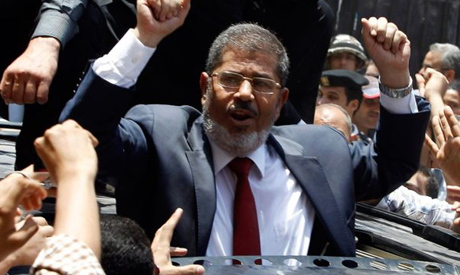
Mohammed Morsi of the Muslim Brotherhood waves to his supporters after casting his vote at a polling station Cairo, June 16, 2012. (Photo: Reuters)
The Council of Europe on Thursday expressed its concern at the "obstacles" threatening democracy in Egypt, which will swear in its first civilian president this Saturday.
While welcoming the election of Mohamed Morsi, the Islamist winner of Sunday's presidential poll, the Council's Parliamentary Assembly (PACE) said in a resolution that it was worried about "real obstacles to democracy" in the country.
"The newly elected President, from the ranks of the Muslim Brotherhood, appears to enjoy the necessary legitimacy to initiate the badly needed reforms to build up a civil administration free from the corrupt practices of the past," the resolution from PACE said.
But, it cautioned, Morsi "will first have to face the challenge of reassuring those Egyptians who are longing for security and stability and the chance to build the country's economy, but who are, at the same time, deeply polarised."
These developments "constitute real obstacles to a slowly emerging democracy in a country which has virtually no democratic experience," the resolution warned.
PACE, which is composed of parlementarians from the Council of Europe's 47 member states, said it regretted a decision earlier this month by Egypt's top court to dissolve the country's democratically elected parliament.
Following the disbanding, the military assumed legislative powers and formed a powerful national security council that is headed by the president but dominated by generals.
Europe also has misgivings over the continuing military dominance in Egypt and role of the Supreme Council of the Armed Forces (SCAF) in particular, the resolution said.
The SCAF, which took control after the uprising that ousted president Hosni Mubarak in February 2011, will retain broad powers even after it formally transfers control to Morsi at the end of June.
Last year's Arab Spring revolution did not improve things for Egypt's Coptic Christians, the Council's resolution added, who "continue to be the target of violent acts".
Short link: